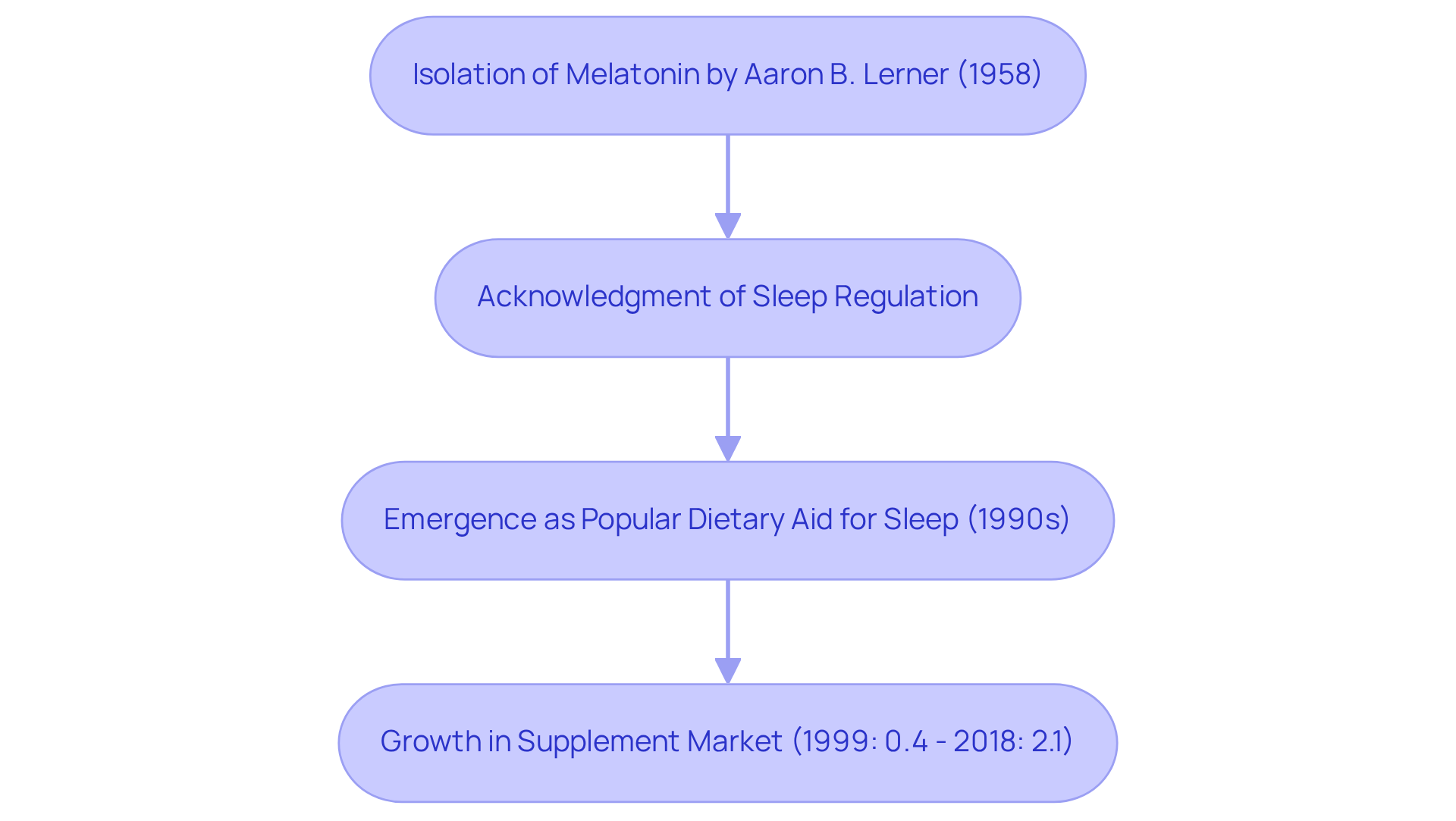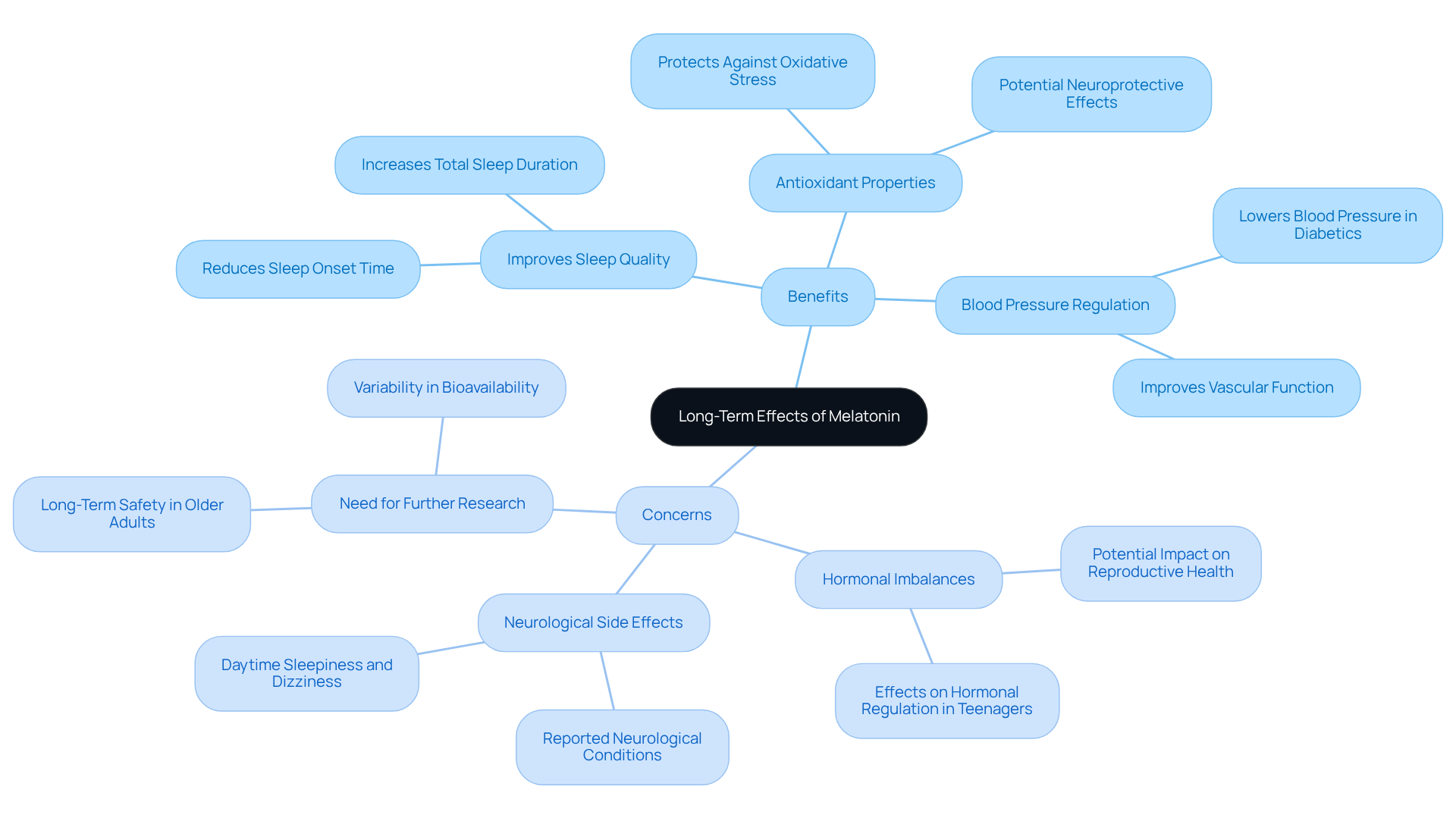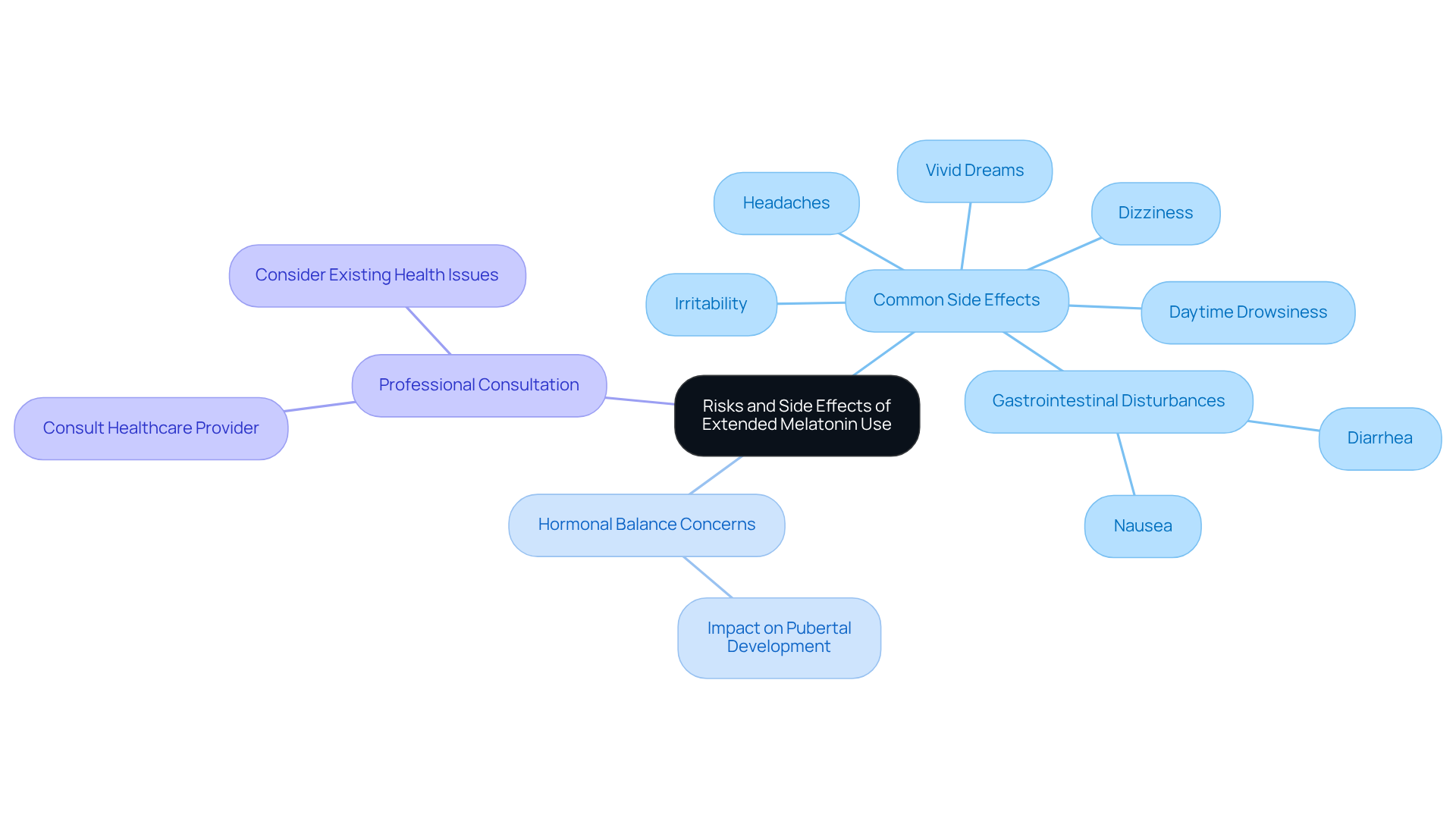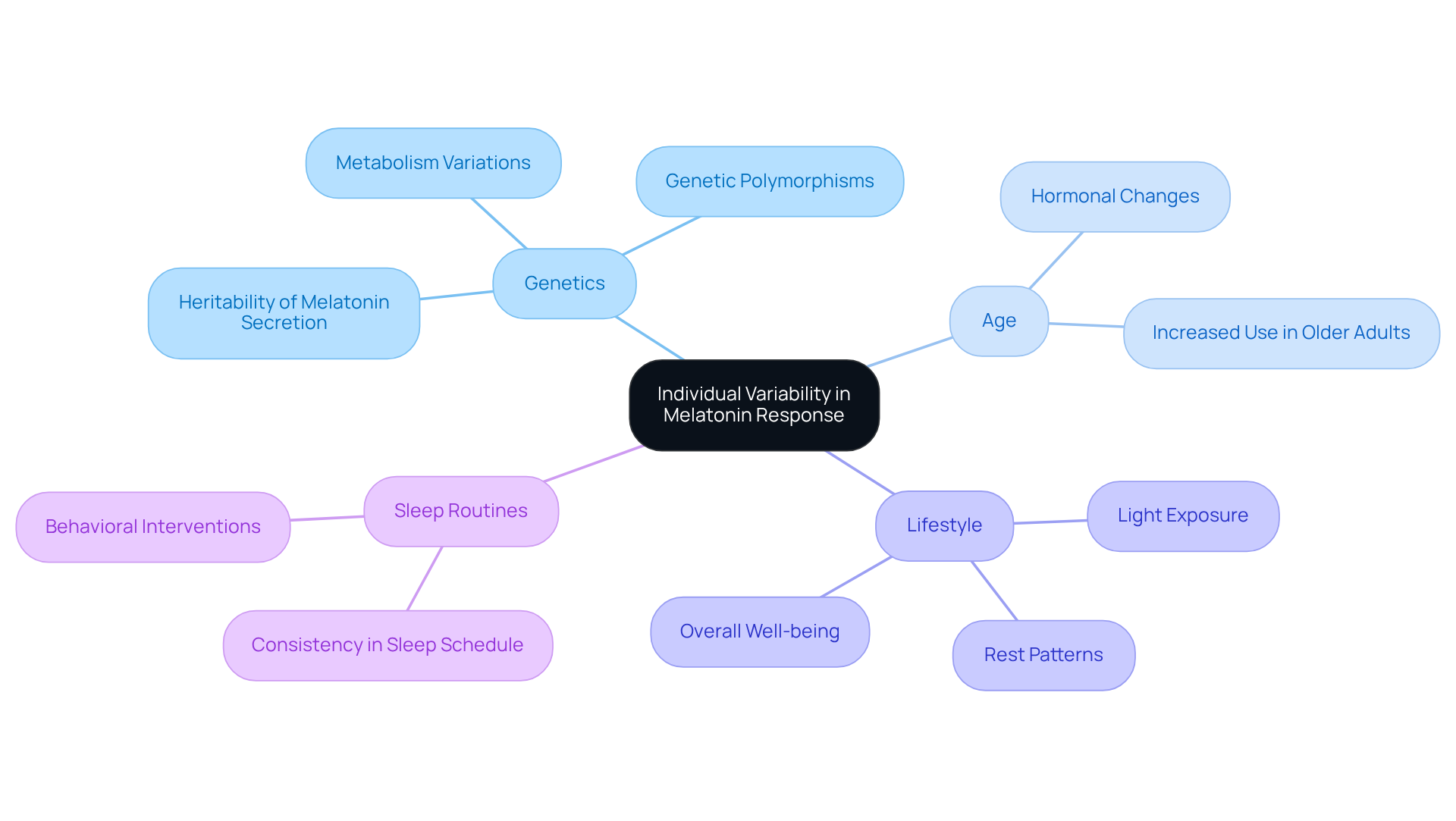Understanding the Long Term Effects of Melatonin on Health
Overview
The long-term effects of melatonin on health encompass notable improvements in sleep quality, along with potential benefits for conditions associated with oxidative stress. However, it is essential to consider the concerns surrounding hormonal imbalances and possible side effects. This perspective is supported by discussions on melatonin’s role in enhancing both sleep duration and quality, as well as its antioxidant properties. In addition, the article highlights significant risks, including neurological side effects and hormonal disruptions, particularly among younger populations. Understanding these factors is crucial for those considering melatonin as a supplement.
Introduction
Melatonin, a hormone primarily produced by the pineal gland, plays a significant role in regulating sleep patterns and enhancing overall well-being. As its popularity surges, especially as a supplement for individuals facing sleep difficulties, understanding its long-term effects becomes increasingly crucial.
While melatonin offers promising benefits, such as:
- Improved sleep quality
- Antioxidant protection
Concerns regarding its safety and potential side effects, particularly with prolonged use, persist.
What are the true implications of long-term melatonin supplementation on health? How can individuals navigate the complexities of its use in their quest for better sleep? Exploring these questions can provide valuable insights into the safe and effective use of melatonin.
Define Melatonin: Nature and Function
Melatonin is a hormone synthesized primarily in the pineal gland during the night. It plays a pivotal role in regulating the sleep-wake cycle, or circadian rhythm. Its levels increase in the evening, inducing sleepiness, and decrease in the morning, signaling the body to wake. Studies suggest that this hormone can decrease the time taken to fall asleep by roughly seven minutes and extend overall rest duration by around eight minutes, underscoring its efficacy as a nighttime assistance.
Beyond sleep regulation, melatonin is celebrated for its antioxidant properties, which protect cells from oxidative stress caused by free radicals. This protective function is especially crucial as individuals grow older, since oxidative damage is associated with various age-related wellness concerns. Specialists observe that the hormone’s antioxidative properties may aid in metabolic regulation and neuroprotection, further emphasizing its importance in overall well-being maintenance.
Furthermore, the essential function of rest in enhancing cognitive abilities, physical well-being, and immune strength cannot be emphasized enough. Insufficient rest has been adversely linked to these areas of well-being. Personal experiences shared by numerous health-aware individuals highlight how including this supplement in their routines has not only enhanced their rest quality but also benefited their overall vitality.
Consequently, melatonin emerges as an essential element not only for the quality of rest but also for its long term effects of melatonin on enhancing health and vitality.
Explore the History and Development of Melatonin Use
Melatonin, first isolated in 1958 by American dermatologist Aaron B. Lerner and his team at Yale University, was initially recognized for its ability to lighten skin pigmentation in amphibians. However, its role in regulating rest was acknowledged shortly thereafter. Over the decades, research has expanded to explore the potential advantages of this hormone beyond sleep, including its impacts on mood, immune function, and aging.
The 1990s marked a pivotal change in public attention, as melatonin emerged as a popular dietary aid for sleep issues and various wellness matters. Today, it is recognized not only for its sleep-enhancing qualities but also for its encouraging role in promoting longevity and overall well-being.
The worldwide supplement market has experienced notable growth, with consumption among U.S. adults rising from 0.4% in 1999 to 2.1% in 2018. This increase indicates a significant shift in public wellness behaviors and perspectives regarding sleep aids. As a result, there is a pressing need for continuous investigation into the long term effects of melatonin, especially as its popularity continues to rise.

Examine Long-Term Effects of Melatonin on Health
Prolonged use of this hormone has been linked to various health impacts, showcasing both advantages and potential drawbacks. Studies indicate that this hormone can significantly enhance sleep quality and duration, particularly for individuals facing sleep-related challenges. For example, research suggests that hormone supplementation may increase total sleep duration by approximately 12.8 minutes and reduce sleep onset time by around 4 minutes, making it a viable option for improving sleep in older adults.
Importantly, insomnia symptoms are reported in up to 50% of individuals over the age of 60, underscoring the relevance of this hormone as a treatment alternative. Additionally, its potent antioxidant properties suggest a protective role against age-related conditions, including neurodegenerative diseases and cardiovascular issues. Notably, melatonin concentrations remain elevated for 90 minutes post-ingestion, potentially enhancing its effectiveness for sleep improvement.
Furthermore, this hormone has been shown to lower blood pressure in type 1 diabetic teenagers and improve vascular function, which is crucial for maintaining cardiovascular health as one ages. However, concerns about the long term effects of melatonin as a supplement continue to be raised regarding its safety. Some studies indicate that prolonged usage may lead to hormonal imbalances, particularly in teenagers, which could impact reproductive health. Alarmingly, 43% of reported side effects were neurological conditions, highlighting the importance of addressing safety and potential downsides associated with extended use.
While this hormone is generally considered safe for short-term use, the variability in its bioavailability and the risk of adverse effects necessitate further investigation to fully understand the long term effects of melatonin on health, particularly in older populations. As sleep disorders become more prevalent with age, improving sleep quality through supplementation remains a critical public health issue, calling for a thorough evaluation of its benefits and risks.

Assess Risks and Side Effects of Extended Melatonin Use
While this hormone is generally regarded as safe for short-term use, it is important to consider the long term effects of melatonin supplementation, which can lead to various side effects. Commonly reported issues include:
- Daytime drowsiness
- Dizziness
- Headaches
- Vivid dreams
- Irritability
- Gastrointestinal disturbances such as nausea or diarrhea
More serious concerns arise regarding hormonal balance, particularly in children and adolescents, due to the long term effects of melatonin, which may disrupt normal pubertal development with prolonged use.
Studies suggest that treatment with the hormone may have minimal to no effect on pubertal timing after 2-4 years; however, the long term effects of melatonin could possibly lead to delays in puberty. Although this hormone is less likely to lead to dependency than conventional sleep aids, the risk persists, particularly with prolonged use.
Healthcare professionals highlight the significance of consulting with a provider before starting long-term supplementation of this sleep aid, particularly to understand the long term effects of melatonin, especially for individuals on other medications or those with existing health issues. This caution is underscored by the notable rise in hormone use among children and adolescents, emphasizing the necessity for thorough safety data to guide clinical practices.

Understand Individual Variability in Melatonin Response
Individual variability in sleep hormone response is influenced by several factors, including genetics, age, and lifestyle. Genetic variations can affect the metabolism of this hormone in the body, leading to differences in its effectiveness and side effects among individuals. For instance, some may metabolize the hormone more quickly, necessitating higher doses to achieve the desired effects, while others might be more sensitive to lower doses.
Furthermore, factors such as light exposure, rest patterns, and overall well-being can significantly impact hormone levels and their effectiveness. Establishing a consistent nightly routine is crucial, as individual experiences indicate that such routines facilitate falling asleep and maintaining sleep throughout the night.
Understanding these individual differences, along with the long term effects of melatonin and the importance of sleep routines, is essential for optimizing the use of melatonin. This knowledge ensures that supplementation is both safe and effective for each person. By recognizing how personal factors influence sleep hormone response, individuals can make informed decisions about their sleep health.

Conclusion
Melatonin plays a vital role in regulating sleep and supporting overall health, making its long-term effects worthy of careful consideration. As a natural sleep aid, melatonin not only improves sleep quality but also provides protective benefits against oxidative stress and age-related conditions. Its increasing popularity as a supplement reflects a growing public awareness of sleep health and wellness, highlighting the need for continuous research into its comprehensive effects on the body.
Key insights indicate that while melatonin can significantly enhance sleep duration and quality, particularly among older adults, it is not without potential drawbacks. Concerns regarding hormonal imbalances, especially in younger populations, underscore the necessity for caution in its long-term use. Furthermore, individual variability in response to melatonin supplementation reinforces the importance of personalized approaches to sleep health, taking into account factors such as genetics and lifestyle.
Ultimately, understanding the long-term effects of melatonin supplementation is crucial for optimizing its benefits while minimizing risks. As sleep disorders become increasingly common, individuals are encouraged to consult healthcare professionals before incorporating melatonin into their routines. This proactive approach ensures that melatonin can be effectively utilized to enhance sleep quality and overall well-being in a safe manner.
Frequently Asked Questions
What is melatonin and what is its primary function?
Melatonin is a hormone synthesized primarily in the pineal gland during the night. Its primary function is to regulate the sleep-wake cycle, or circadian rhythm, by increasing levels in the evening to induce sleepiness and decreasing levels in the morning to signal the body to wake.
How does melatonin affect sleep?
Melatonin can decrease the time taken to fall asleep by roughly seven minutes and extend overall rest duration by around eight minutes, making it effective as a nighttime assistance.
What are the antioxidant properties of melatonin?
Melatonin has antioxidant properties that protect cells from oxidative stress caused by free radicals. This function is particularly important as individuals age, as oxidative damage is linked to various age-related health issues.
How does melatonin contribute to overall well-being?
Melatonin plays a crucial role in enhancing cognitive abilities, physical well-being, and immune strength. Insufficient rest can negatively impact these areas, and many health-conscious individuals report improved rest quality and overall vitality when incorporating melatonin into their routines.
What is the history of melatonin’s use?
Melatonin was first isolated in 1958 by American dermatologist Aaron B. Lerner and his team, initially recognized for its ability to lighten skin pigmentation in amphibians. Its role in regulating rest was acknowledged shortly thereafter, leading to expanded research on its benefits beyond sleep.
How has the popularity of melatonin changed over time?
In the 1990s, melatonin gained significant public attention as a dietary aid for sleep issues and wellness matters. Its consumption among U.S. adults rose from 0.4% in 1999 to 2.1% in 2018, indicating a shift in public wellness behaviors regarding sleep aids.
What is the current status of research on melatonin?
As melatonin’s popularity continues to rise, there is a pressing need for ongoing research into its long-term effects, particularly regarding its impact on sleep, mood, immune function, and aging.






